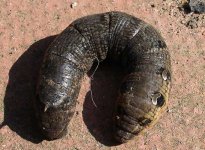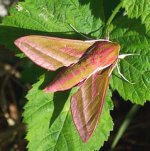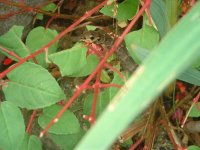After an absence of 2 weeks from my garden I have noticed that my lovely fuschia has been stripped bare. The culprits are 6 caterpillars from the Elephant Hawk-Moths. It took me a while searching on the web sites to identify these hugh fat caterpillars with a snake like appearance but I am now convinced that I have identified them correctly.
I live in South West England and today - 9 Sept 04 has been one of the warmest yet. Anyone else out there found any recently?
Regards
Julie I
I live in South West England and today - 9 Sept 04 has been one of the warmest yet. Anyone else out there found any recently?
Regards
Julie I
Last edited:






